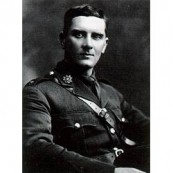Composers
Ernest Bristow Farrar (7 July 1885–18 September 1918) was an English composer, pianist and organist
Ernest Farrar was born in Lewisham, London. The son of a clergyman, he was educated at Leeds Grammar School, where he began organ studies and in May 1905 won a scholarship to the Royal College of Music. There, he studied with Sir Charles Villiers Stanford and Sir Walter Parratt. He also took up several posts as organist in Dresden, South Shields and Christ Church, High Harrogate. At Harrogate, he worked closely with Julian Clifford. In 1913, he married Olive Mason in South Shields. His best man was Ernest Bullock.
His career was cut short by the outbreak of World War I, as he enlisted in the Grenadier Guards in 1915 and joined the regiment in August 1916. He was commissioned as Second Lieutenant, 3rd Battalion Devonshire Regiment on 27 February 1918.
Farrar was killed on the Western front at the Battle of Epehy Ronssoy, near Le Cateau in the Somme valley south, west of Cambrai, in 1918.
His grave lies just outside the churchyard wall in Ronssoy Communal Cemetery Extension, in a corner under some trees. A Requiem was said at Micklefield, on 29 September, the Feast of St. Michael and All Angels. A concert was dedicated to his memory at Harrogate by Julian Clifford on 17 September 1919, including a tone-poem Lights Out written expressly for Farrar, and Farrar's work Variations in G for pianoforte and orchestra on an old British sea-song.
Refine by search
view all| Country: | England |
| Period: | Romantique |
Biography
Ernest Bristow Farrar (7 July 1885–18 September 1918) was an English composer, pianist and organist
Ernest Farrar was born in Lewisham, London. The son of a clergyman, he was educated at Leeds Grammar School, where he began organ studies and in May 1905 won a scholarship to the Royal College of Music. There, he studied with Sir Charles Villiers Stanford and Sir Walter Parratt. He also took up several posts as organist in Dresden, South Shields and Christ Church, High Harrogate. At Harrogate, he worked closely with Julian Clifford. In 1913, he married Olive Mason in South Shields. His best man was Ernest Bullock.
His career was cut short by the outbreak of World War I, as he enlisted in the Grenadier Guards in 1915 and joined the regiment in August 1916. He was commissioned as Second Lieutenant, 3rd Battalion Devonshire Regiment on 27 February 1918.
Farrar was killed on the Western front at the Battle of Epehy Ronssoy, near Le Cateau in the Somme valley south, west of Cambrai, in 1918.
His grave lies just outside the churchyard wall in Ronssoy Communal Cemetery Extension, in a corner under some trees. A Requiem was said at Micklefield, on 29 September, the Feast of St. Michael and All Angels. A concert was dedicated to his memory at Harrogate by Julian Clifford on 17 September 1919, including a tone-poem Lights Out written expressly for Farrar, and Farrar's work Variations in G for pianoforte and orchestra on an old British sea-song.



![Great European Organs. 66-Graham Barber [Ripon Cathedral]](http://static.classicalm.com/repository/collection-cover/small/971-img1342718008531169.jpg)